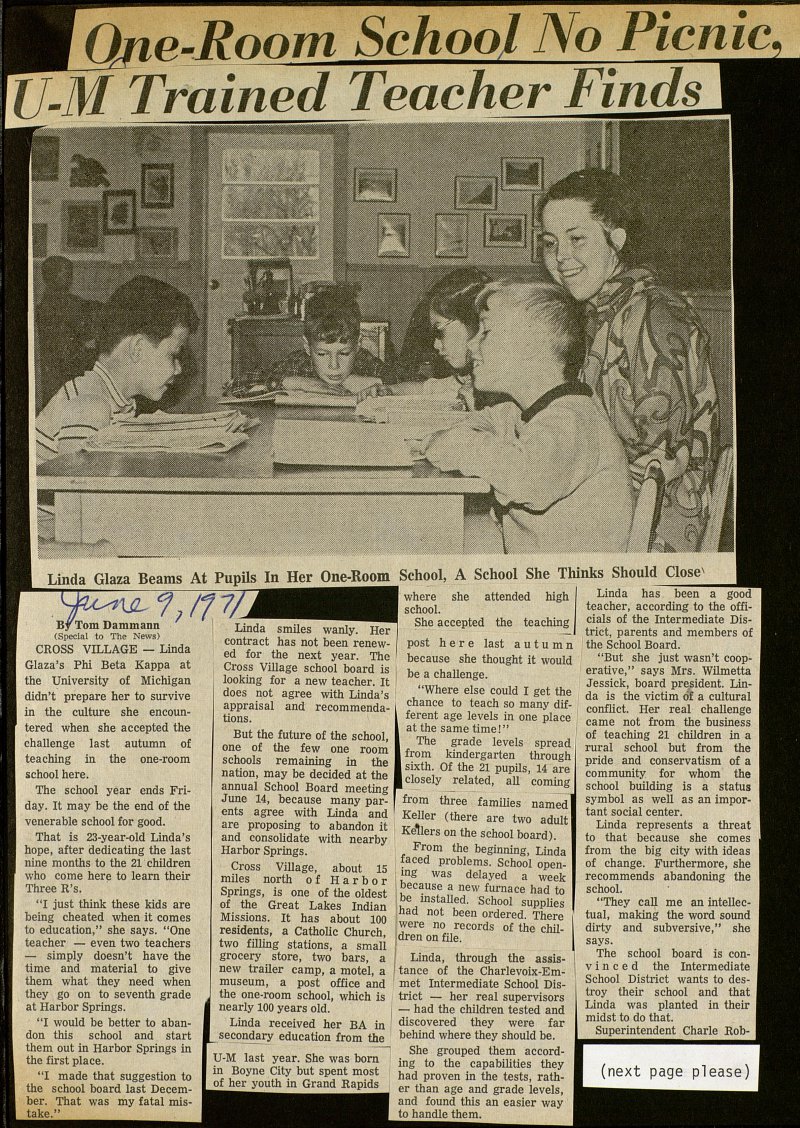One-room School No Picnic, U-m Trained Teacher Finds


CROSS VILLAGE - Linda Glaza's Phi Beta Kappa at the University of Michigan didn't prepare her to survive in the culture she encountered when she accepted the challenge last autumn of teaching in the one-room school here. The school year ends Friday. It may be the end of the venerable school for good. That is 23-year-old Linda's hope, after dedicating the last nine months to the 21 children who come here to learn their Three R's. "I just think these kids are being cheated when it comes to education," she says. "One teacher - even two teachers - simply doesn't have the time and material to give them what they need when they go on to seventh grade at Harbor Springs. "I would be better to abandon this school and start them out in Harbor Springs in the first place. "I made that suggestion to the school board last December. That was my fatal mistato Linda smiles wanly. Her contract has not been renewed for the next year. The Cross Village school board is looking for a new teacher. It does not agree with Linda's appraisal and recommendations. But the future of the school, one of the few one room schools remaining in the nation, may be decided at the annual School Board meeting June 14, because many parents agree with Linda and are proposing to abandon it and consolídate with nearby Harbor Springs. Cross Village, about 15 miles north of Harbor Springs, is one of the oldest of the Great Lakes Indian Missions. It has about 100 residents, a Catholic Church, two filling stations, a small grocery store, two bars, a new trailer camp, a motel, a museum, a post office and the one-room school, which is nearly 100 years old. Linda received her BA in secondary education from the U-M last year. She was born in Boyne City but spent most af her youth in Grand Kapids where she attended high school. She accepted the teaching post h e r e last aatumi because she thought it would be a challenge. "Where else could I get the chance to teach so many different age levéis in one place at the same time!" The grade levéis spread from kindergarten through sixth. Of the 21 pupils, 14 are closely related, all coming from three families named Keiler (there are two adult Keilers on the school board). From the beginning, Linda faced problems. School opening was delayed a week because a new furnace had to be installed. School supplies had not been ordered. There were no records of the children on file. linda, through the assistance of the Charlevoix-Emmet Intermedíate School District - her real supervisors - had the children tested and discovered they were far behind where they should be. She grouped them according to the capabilities they had proven in the tests, rather than age and grade levéis, and found this an easier way to handle them. Linda has been a good teacher, according to the officials of the Intermedíate Dis. trict, parents and members of i the School Board. [ "But she just wasn't cooperative," says Mrs. Wilmetta Jessick, board president. Lin! da is the victim óf a cultural conflict. Her real challenge 1 carne not from the business , of teaching 21 children in a rural school but from the pride and conservatism of a community for whom the school building is a status symbol as weE as an important social center. Linda represents a threat to that because she comes from the big city with ideas of change. Furthermore, she recommends abandoning the school. "They cali me an intellectual, making the word sound dirty and subversive," she says. The school board is conv i n c e d the Intermedíate School District wants to destroy their school and that Linda was planted in their midst to do that. Superintendent Charle (next page please) ONE ROOM SCHOOL... (conti nued) inson denies this, stating that his office "is the best friend Cross Village has ever had." "It's quite a big controversy," says Mrs. Audrey Keiler, school board secretary. "We're so small and they want consolidation so they can get our tax money. "We don't feel our school is so inadequate. It takes an hour to bus our kids to Harbor Springs and that's too long. I'd rather see them spending that time in the woods, picking flowers and watching the birds. "We welcome newcomers, but we don't want them to change us," Mrs. Keiler says, her cheeks flushing. Mrs. John Krupa, who has lived here since she was 10 years oíd, disagrees. She has three children in school and wants the board to pay for busing them as well as for their tuition (Cross ViUage children under seventh grade I must pay tuition to the HarI bor Springs School, which would not be required under I consolida tion). One of her I children is slow, she explains I and gets farther behind each I year. I "He needs special help, but I he's not retarded so I can't I get special help here," she says. Mrs. Krupa is leadhig a i campaign t o abolish the school. She gets a modicum of silent approval from Father Flavius, Pastor of Holy Cross Church, who urges that the children's education is more important than the school building and its board. She has enthusiastic support from families who have recently settled here. The controversy is heating up as June 14 approaches. Linda is looking for a job. She has one for the summer at the new trailer camp. Meanwhile, she spends her leisure hours bird watching and trout fishing with a young njan who is a product of Cross Village's one-room school.